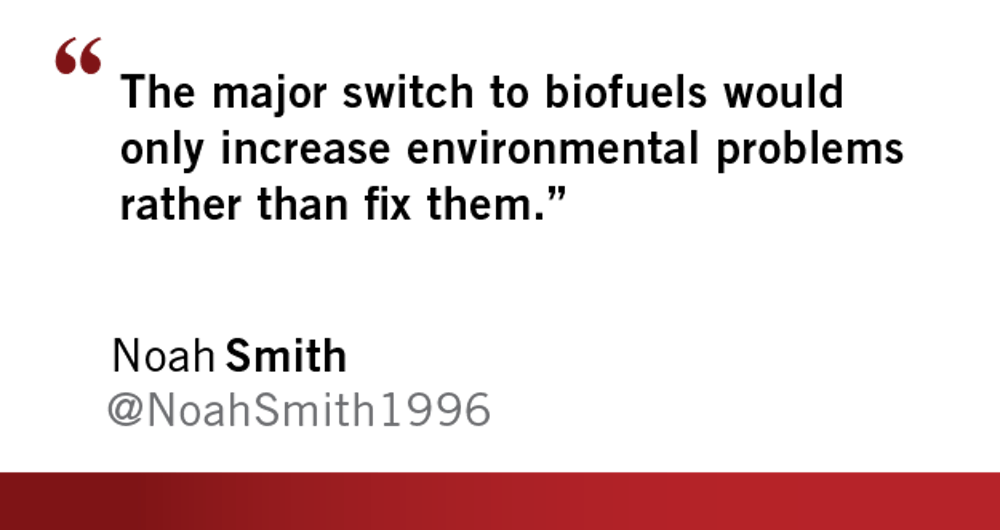The idea of biofuels was once a lone bright light in an age dominated by fossil fuels and the omnipresence of global warming.
It was thought that using biofuels, rather than oil, would stabilize the booming amount of carbon released annually by cars while simultaneously reducing greenhouse gases. Plus, the best aspect of the biofuel debate was that converting corn, soybeans and other food crops into biomass was technology that was both readily and easily available today! As a result, governments around the globe have begun to incorporate bioenergy into fuels in order to drastically reduce the world’s dependence on gasoline.
That must mean that I can start believing that biofuels actually do work! While I am at it, I should also start betting on the Arizona Diamondbacks winning the World Series, too!

The fact is that, unfortunately, biofuels do nothing to reduce the effects of global warming on this planet of ours. According to the New York Times, the problem with biofuels is that this strategy of harnessing energy involves ignoring the “opportunity costs” of deploying vegetation as a source of energy. Cutting down a cornfield or any vegetation to produce energy eliminates one of the most useful aspects of such biomass: storing carbon. Burning biomass in the form of vegetation in order to make fuel comes with the expense of reduced carbon storage. Eliminating plants that store carbon does absolutely nothing to counter greenhouse gases.
Critics of biofuel have been crying foul for years now by making the arguments that biofuel production takes agricultural land from food production, leading to the skyrocketing of the price of staple crops. Even early in 2008, the journal "Science" started predicting problems with biofuels, long before the Obama administration started paying billions of dollars to producers of such alternative energy.
According to Time’s report on the study, the journal found that corn ethanol produce in the U.S. had a carbon debt of 93 years, meaning that it would take nearly a century for ethanol to make up for the carbon released in the initial landscape conversion. Even soybeans grown in the Amazon converted to biodiesel, which are currently responsible for mass deforestation, have a carbon debt of 320 years.
A similar Yale article argues that in order to replace just 10 percent of gasoline in the U.S. with ethanol and biodiesel, it would need exactly 43 percent of all U.S. cropland for biofuel feedstock. That is thousands, even millions, of acres that would take away from valuable agriculture production here in the U.S.
The World Resources Institute believes that, in order for bioenergy to be responsible for 20 percent of the world’s energy demand within the next 50 years, such targets would call for at least doubling the world’s harvest of planet material. Those needs directly come into conflict with the already large, and growing, food and timber needs that a prevalent throughout the entire world. A study done by the U.S. National Academy of Sciences points out that a bio refinery that produces 100 million gallons of ethanol a year would use the equivalent of the water supply for a town of about 5,000, generating challenges upon local water supplies.
The idea of bioenergy being used on a large scale is unrealistic and simply cannot be sustainable on an already overburdened planet. The major switch to biofuels would only increase environment problems rather than fix them.
Reach the columnist at ndsmit12@asu.edu or follow @noahsmith1996 on Twitter.
Like The State Press on Facebook and follow @statepress on Twitter.
Editor’s note: The opinions presented in this column are the author’s and do not imply any endorsement from The State Press or its editors.
Want to join the conversation? Send an email to opiniondesk.statepress@gmail.com. Keep letters under 300 words and be sure to include your university affiliation. Anonymity will not be granted.




